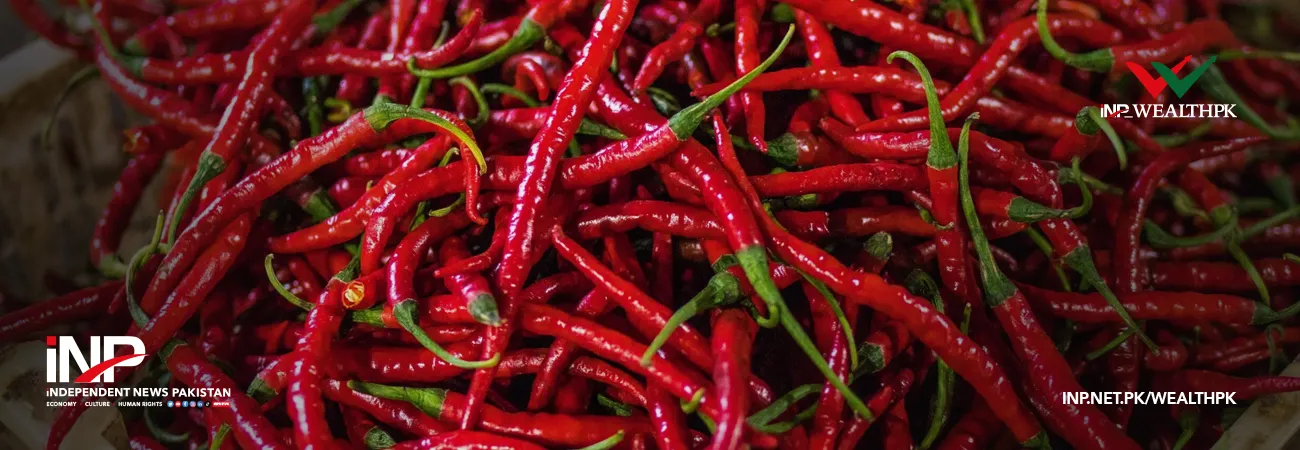INP-WealthPk
Azeem Ahmed Khan
A leading Pakistani firm aims to export 60,000 tonnes of hybrid red chillies to China under a joint venture agreement over the next five years. Recently, two leading food companies from China and Pakistan forged the agreement aimed at exporting red chillies to China. These chillies will be cultivated across 200,000-acre land in Pakistan. This milestone collaboration is set to boost Pakistan's economy by fetching foreign exchange. Chen Changwei, Chairman of Litong Food, travelled from China to Karachi specifically to sign a memorandum of understanding (MoU) with Shahzad Ali Malik, Chief Executive Officer (CEO) of Guard Agriculture Research and Services (GARS). “The agreement focuses on the cultivation of hybrid sun-dried red chillies in Pakistan for export under the China-Pakistan Economic Corridor (CPEC) initiative.
These hybrid chillies, measuring over six inches in length, will be packed in Lahore before being processed and marketed in China through Litong Food's value-added plants,” Shahzad told WealthPK. This programme is poised to enhance the profitability of Pakistani producers in the regions of interior Sindh and South Punjab, and concurrently by exporting chillies to China. Shahzad stated that the production of hybrid red chillies will commence at approximately 5,000 tonnes and is projected to progressively escalate to 60,000 tonnes over the ensuing five years. “While Litong Food initially requested GARS to export 15,000 tonnes of chillies in the first year, a cautious approach led to the provision of 5,000 tonnes to ensure the completion of the agreement,” the GARS CEO said.
The first phase will involve the cultivation of chillies on 10,000 acres of land in Sindh province, and 5,000 acres in Punjab province. “In contrast to traditional chilli varieties, which yield only 1.2 metric tonnes per acre, hybrid chilli variants offer three harvests per planting, and a production of 3.2 metric tonnes per acre,” Shahzad said. Hybrid cultivars yield higher profits compared to conventional crops, besides exhibiting strong resistance to pests, diseases, and the environment. Some 16 distinct chilli varieties have been introduced in Pakistan, which were carefully selected to demonstrate both high yields and quality, as well as adaptation to the local climate. Litong Food, renowned as one of the largest seed breeders in China, will import the produce in exchange for hybrid seeds and technical assistance for local farmers.
“Litong Food will play a pivotal role in training local farmers in effective agricultural practices for chilli cultivation and sun-drying,” Shahzad highlighted. Litong has already achieved impressive results with hybrid chilli seeds in GARS research facilities situated in South Punjab and interior Sindh. By the end of the fifth year, GARS envisions enhancing hybrid chilli output across 200,000 acres of land in Punjab and Sindh provinces through a phased approach, promising increased employment opportunities and revenue for the local populace. Chillies are now a staple in almost every cuisine in China, with notable use in regions such as Sichuan, Hunan, Beijing, Hubei, and Shaanxi. Countless recipes incorporate chillies, including Chongqing hot pot, laziji, and double-coloured fish heads. Chinese cooks also employ chillies extensively in soups, sauces, and various dishes. Notably, over 50% of the world's chilli pepper production originates in China, according to the Food and Agriculture Organisation (FAO) of the United Nations.
In northern China, spicy meals are believed to enhance blood circulation and alleviate coldness, while in the south, their spiciness is believed to effectively remove moisture from the body. “Of the total 150,000 tonnes of chillies imported by China, approximately 60,000 tonnes are sourced from India,” Shahzad said. But now Pakistan has emerged as a promising food import partner for China. Shahzad emphasised that collaboration between Pakistan and China in the agriculture sector, particularly in the private sector's development of novel hybrid seed varieties, presents substantial benefits for both nations. The GARS CEO hopes that beyond elevating the farmers' living standards, technological knowledge transfer through this programme will contribute to poverty alleviation in rural areas of Pakistan by creating jobs for agricultural professionals. He said that GARS has already hired agricultural graduates and provided training to the company's technical staff, farmers, and other stakeholders.
Credit: INP-WealthPk













